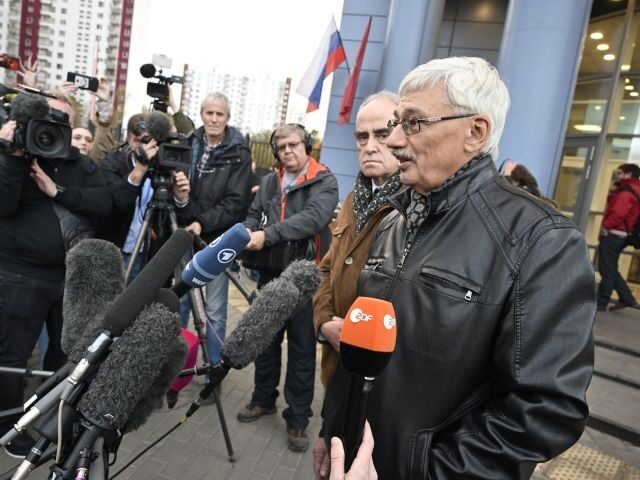The Norwegian Nobel Committee announced on Friday that the 2022 Peace Prize will be awarded to Belarusian human rights activist Ales Bialiatski and two organizations, Memorial of Russia and the Center for Civil Liberties in Ukraine.
“The Peace Prize laureates represent civil society in their home countries. They have for many years promoted the right to criticize power and protect the fundamental rights of citizens. They have made an outstanding effort to document war crimes, human right abuses and the abuse of power. Together they demonstrate the significance of civil society for peace and democracy,” the Nobel Committee said.
The committee lauded Bialiatski as “one of the initiators of the democracy movement that emerged in Belarus in the mid-1980s,” and the founder of the human rights advocacy group Viasna in 1996. Viasna, whose name translates to “Spring” in English, is dedicated to helping political prisoners in Belarus and opposing authoritarian rule.
Viasna noted that 60-year-old Bialiatski has received numerous human rights awards over the past 25 years, including the Andrei Sakharov Freedom Award, the Vaclav Havel Human Rights Prize, and the U.S. State Department’s Human Rights Defenders Award.
Unsurprisingly, the brutish dictatorship of Belarusian strongman Alexander Lukashenko is much less enamored of Bialiatski than the international human rights community. Bialiatski was arrested on dubious “tax evasion” charges in 2011, released in 2014, and arrested again in 2021 for protesting against Lukashenko’s latest rigged “re-election.”
Lukashenko has been in power since 1994. He is a close ally of Russian leader Vladimir Putin and supports Putin’s invasion of Ukraine, although he has resisted committing Belarusian troops to the effort and has lately been muttering that Putin’s war is not going as well as hoped.
Bialiatski has been held without trial since his arrest. His own lawyers are forbidden to speak about his case in public. Human Rights Watch (HRW) noted in October 2021 that six other members of Viasna were jailed, and dozens more were harassed by the government, as part of a “brutal crackdown” and “purge of civil society” ordered by Lukashenko.
Memorial, founded in Russia in 1987, has a mission to support and honor victims of political oppression similar to Viasna’s. Memorial’s first leader was none other than Andrei Sakharov, the famed Soviet dissident and recipient of the 1975 Nobel Peace Prize.
Memorial was liquidated by the current Russian regime in December 2021, supposedly for violating Russia’s “foreign agents” law. The shutdown order was upheld by Russia’s Supreme Court in February 2021, despite an outcry from human rights organizations around the world and a legal challenge from the European Court of Human Rights. No one from Memorial was permitted to attend the hearing at which the group’s fate was sealed.
Memorial’s members have done their best to continue the group’s work, even after they were deprived of headquarters and resources.
“Memorial understands the parallels between Putin’s regime and the Soviet regime … Stalin’s regime. And it makes these parallels published and informs everyone about how all these regimes are similar,” Memorial board member Tatyana Glushkova told the Associated Press on Friday.
Glushkova noted Memorial was due in court on the very day its Nobel Peace Prize was announced, in a case “related to its office building in central Moscow.”
Ukraine’s Center for Civil Liberties, established in 2007, has served as a watchdog on Russian war crimes during the invasion of Ukraine. The group has also chronicled the Russian regime’s efforts to suppress journalism and silence its political opponents.
“In collaboration with international partners, the center is playing a pioneering role with a view to holding the guilty parties accountable for their crimes,” the Nobel Committee noted.
“It’s a big honor for us to receive this prize and also for our partners. It’s very important for the establishment of human rights and for the affirmation of human dignity,” Center for Civil Liberties Executive Director Oleksandra Romantsova said on Friday.
“All of my 20 years of experience in the fight for freedom and human rights has shown me that ordinary people have far more influence than they think. Mass mobilization of ordinary people in different countries of the world and their joint voice can change world history faster than U.N. intervention,” said Olkesandra Matviychuk, head of the Center for Civil Liberties’ board of directors.
Nobel Committee Chairwoman Berit Reiss-Andersen told reporters the Nobel Peace Prize awards were not selected as a rebuke to Putin and Lukashenko but then admitted they actually kind of were.
“This prize is not addressing President Putin, not for his birthday or in any other sense, except that his government, as the government in Belarus, is representing an authoritarian government that is suppressing human rights activists,” she said.
“We are talking about two authoritarian regimes and one nation fighting a war and we would like to highlight the importance of civic society,” she added.
Reiss-Andersen called on the Russian government to release Bialiatski from prison or at least allow him to receive his Peace Prize in person. Prize Committee Secretary Olav Njoelstad said on Friday that if Bialiatski remains imprisoned, the ceremony might include an empty chair placed on the stage in his honor, as Chinese human rights activist Liu Xiaobo was honored in 2020.

COMMENTS
Please let us know if you're having issues with commenting.